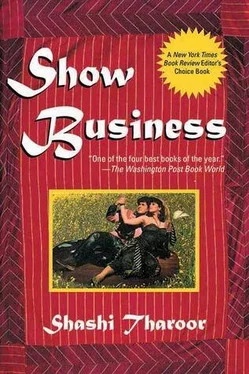As I walk toward him, I see that he is laughing. Great waves of silent mirth convulse him in his cross-legged pose, so that his be-robed body literally quakes on the mattress. Strands of gray beard disappear into his closed mouth, his sparkling eyes dance with merriment, his hands helplessly hold his sides. I don’t see what is so funny, unless, while he was meditating, some higher consciousness cracked a joke on the astral plane.
“AB!” the Guru says at last. “So you really didn’t recognize me!”
Incredulous, I advance closer to the august presence, trying to visualize a face behind the beard. “Tool!” I exclaim. “What on earth are you doing behind all that shrubbery?”
“Shh,” Atul (“Tool”) Dwivedi, fellow Fransiscan and Coffee House habitue of collegiate notoriety, raises a long-nailed finger to his lips. “Not so loud, or you’ll have the entire ashram down on us.” He pats a place next to him on the mattress. “Try and look reverential, in case anyone looks in,” he says. “God, it’s good to see you.”
“It’s good to see you, god,” I respond irreverently. “How did all this happen? Didn’t you go off to BHU to study philosophy or something? No one’s heard a thing out of you since.”
“I did go to the Benares Hindu University,” Tool confirms, his eyes now droll rather than divine. “To study philosophy. And — other things.”
“And what happened to your hair? And this beard — almost white already?”
“Don’t you remember my father? Premature baldness runs in the family. And the things I have thought about over the years,” Tool says, “have grayed me. But we’re not young anymore, Ashok, you and I. You must be over forty.”
“Forty-one next week.” I had not really imagined that that disqualified me from thinking of myself as young. Tool has sobered me.
“How do you stay like this? You must have a picture in the attic.” We had both seen The Picture of Dorian Gray in preference to reading the book.
“Fifty pictures,” I joke. “Almost all of them hits.”
“Yes, I’ve been reading about you.” Tool adopts the distant gaze of his scriptural discourse and quotes from memory. “Darlings, national politics will never be the same again, at least not for our ruling party. Cheetah has learned that a funny thing happened on the way to the quorum: the Prime Minister has decided to offer a party ticket to Bollywood’s reigning box office monarch, your very own Ashok Banjara. Of course, it can only be the kind of coincidence so beloved of our scriptwriters that the constituency from which the PM wants to make this MCP an MP has belonged for goodness knows how many years to the Banjara Daddy! Who would ever suggest that our hero hasn’t got everything on his own merit? Not Cheetah, my little cubs. After all, with so much talk these days of more women candidates being nominated, our Hungry Not-So-Young Man could make an excellent Minister for Parliamentary Affairs, eh? Grrrowl!” The Guru’s eyes twinkle at my evident astonishment. “So you see, I’ve been expecting your visit.”
“I can’t believe you read that stuff, let alone know it by heart,” I say.
“But I used to be a filmi fanatic in college! How quickly you forget,” Tool reproaches me. “Besides, theology can be trying. A Guru must have his little pleasures.”
“Time for kama, hanh?” I joke. “By the way, thanks for the endorsement.”
“My pleasure,” he responds, and I imagine the weak pun is intended. That’s how we all were at St. Francis’. “But it wasn’t entirely unmotivated. I need your help.”
“You? Mine? I thought you had it made here. Women, prestige, adulation — what more could any Franciscan want?”
The Guru scratches his bottom through the robe. “I’ll answer that philosophically some other time,” he replies. “But the short answer is, I’m getting rather tired of the rural life. Too many mosquitoes and not enough electricity. I’m thinking of making a move.”
“And what can I do to help?”
“Well, I need your advice, and some contacts,” the spiritual guide says matter-of-factly. “What would you say to my trying to set myself up in Bombay, as a sort of resident Guru to the stars?”
“Why not? I admired your patter this morning.”
“That’s nothing.” The Guru waved a dismissive hand, as if swatting one of his troublesome mosquitoes. “Bollywood doesn’t want abstruse comparisons between cinema and advaita. What it wants is a philosophy to justify itself by.”
“Go on.” I am intrigued.
“Your cinema world is full of mendacity, imitation, corruption, exploitation, and adultery,” he says in the briskly bored tone of a schoolteacher taking a roll call. “It’s endemic, it’s ingrained, it’s part of reality. In fact, all these things are part of the daily assumptions of the Hindi film industry and of those involved with it.”
“And you think you can change that,” I suggest helpfully. “Reform it. Reintroduce spiritual values.”
“On the contrary,” Tool retorts. “It can’t be changed. No one wants to change it, and the system wouldn’t work any other way. After all, despite these things, or more probably because of them, India now has the world’s largest film industry. And it’s one that flourishes with great efficiency and financial viability in the face of some appalling infrastructural, logistical, and technical drawbacks. It’s little short of a miracle that it works as well as it does. Not even a godman wants to mess with a miracle.”
“So what do you want to do there?” I ask, puzzled.
The Guru sighs. “I’ve done my stint of dharma,” he says. “I’ve spent the best years of my life learning, meditating, and now running an ashram. I’ve begun to enjoy a bit of kama at last, especially now that these foreign women have discovered me. The time has come, I think, for artha. I want to live well.”
“Whatever happened to nonattachment?” I ask jocularly.
“Oh, it’s very important,” Tool says. “I want my followers to be completely unattached to their material possessions. The best way of achieving this is, of course, to give it all to the ashram. As for myself, I will own nothing: everything will be in the name of the ashram, for the greater good of its members. But I will have the use of such things as the ashram sees fit to give me, and I intend to have so many that I can afford to be nonattached to any of them.”
This sounds more jesuitical than Vedantic, but I listen keenly as the Guru abandons the digression and returns to my original question. “What I will give Bollywood,” he explains, “is a philosophical framework for its ills. I’m thinking of calling it Hindu Hedonism. Like the sound of that? No? Well, maybe I need to think about that some more. But labels don’t matter, so perhaps I won’t need one. The idea is to let people continue doing all the venal things that they are so successful doing, but to teach them to feel good about them rather than guilty. Done something you feel bad about? You were only fulfilling your dharma. Was it something really terrible? Well, you’ll pay for it in your next life, so continue enjoying this one. Guilt? Guilt is a Western emotion, a Judeo-Christian construct we only feel because we are still the victims of moral colonialism. The very notion of ‘sin’ as some sort of transgression against God’s divine will does not exist in the Hindu soul and should be eradicated from the Indian soil.”
I stare at him in bemusement, unsure whether he is serious. He carries on unperturbed. “Moksha, salvation, is the thing — the idea is not to seek forgiveness for sin and liberation from guilt, but ultimately to escape the entire human condition, to be liberated from space and time and the endless cycle of birth and rebirth. The only sin is violation of your dharma, which means not doing what your situation obliges you to do: Arjuna having moral scruples about killing on the battlefield was in danger of violating his dharma, whereas when he fought and killed he was upholding it — not the kind of thing your Westerner with his Judeo-Christian moral code can easily live with, eh? The Occidental wants to die with no sins in this life to pay for; the Indian should look on death as an opportunity to experience immortality, with the sins of this and previous lives rendered irrelevant.”
Читать дальше












